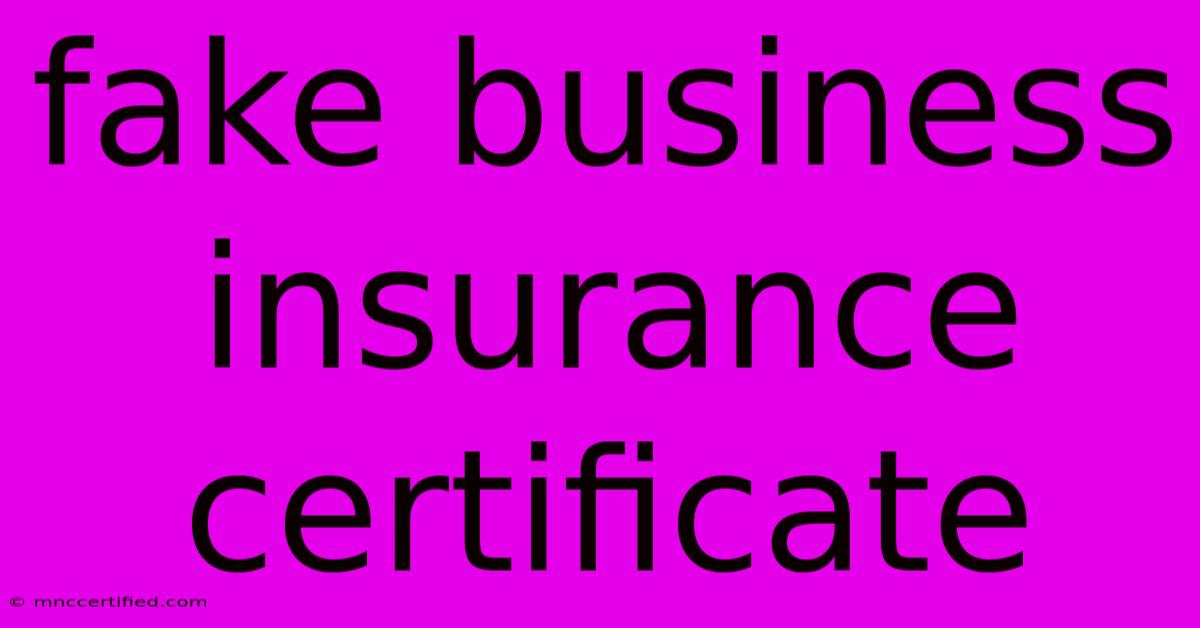Fake Business Insurance Certificate

Table of Contents
The Dangers of Fake Business Insurance Certificates: What You Need to Know
In today's business world, insurance is essential. Whether you're a small startup or a large corporation, having the right insurance coverage can protect you from financial ruin in the event of an accident, lawsuit, or other unforeseen event. Unfortunately, some individuals and businesses choose to cut corners by obtaining fake business insurance certificates, putting themselves and others at risk.
Why Are Fake Insurance Certificates a Problem?
Using a fake business insurance certificate is a serious offense that can have severe consequences. Here's why:
- False sense of security: A fake certificate creates a false sense of security for both the holder and anyone relying on it. If an incident occurs, the holder won't be covered, and the parties involved might suffer significant financial losses.
- Legal repercussions: Using a fake insurance certificate is illegal and can result in hefty fines, imprisonment, or even the loss of your business license.
- Damage to reputation: If you are caught using a fake certificate, your reputation will suffer. Clients, partners, and potential investors might lose trust in your business, leading to financial difficulties.
- Increased liability: If you cause damage or injury without valid insurance, you'll be personally liable for the costs, potentially exposing your personal assets to legal action.
How to Spot a Fake Business Insurance Certificate
It's crucial to be able to identify a fake certificate to avoid getting caught in a fraudulent scheme. Here are some red flags:
- Poor quality: The certificate might appear blurry, have misspellings, or be printed on low-quality paper.
- Missing information: Essential details like the insurer's name, policy number, coverage details, or effective dates might be missing or incomplete.
- Unfamiliar insurer: The insurance company listed might be unfamiliar or nonexistent.
- Unrealistic coverage: The certificate may claim coverage for unrealistic scenarios or offer coverage beyond the scope of typical business insurance policies.
- Suspicious website or contact information: The website or contact information provided on the certificate might seem unprofessional or difficult to verify.
Protecting Yourself from Fake Insurance Certificates
While it's nearly impossible to entirely eliminate the risk of encountering a fake certificate, you can take steps to minimize your exposure:
- Request a copy of the actual policy: Don't settle for a certificate alone. Request a copy of the full insurance policy to verify the information and coverage details.
- Verify the insurer's legitimacy: Contact the insurance company directly to confirm the policy's validity and details.
- Use a reputable insurance broker: Working with a reputable insurance broker can help you obtain genuine insurance policies and avoid potentially fraudulent certificates.
- Check for online resources: Several online resources, like the National Association of Insurance Commissioners (NAIC), can help you verify insurance information.
- Educate your staff: Train your employees to recognize the signs of a fake insurance certificate and report any suspicions to you.
Conclusion
Using a fake business insurance certificate is a risky and unethical practice that can have severe consequences. Be cautious and vigilant when dealing with insurance documents. By understanding the risks, knowing how to spot a fake certificate, and taking proactive steps to verify insurance information, you can protect yourself and your business from potential harm.

Thank you for visiting our website wich cover about Fake Business Insurance Certificate. We hope the information provided has been useful to you. Feel free to contact us if you have any questions or need further assistance. See you next time and dont miss to bookmark.
Featured Posts
-
See My Chemical Romances 2025 Stadium Tour Dates
Nov 13, 2024
-
Prues Bold Admission More Reckless With Age
Nov 13, 2024
-
Trump Eyes Rubio Noem For Top Roles
Nov 13, 2024
-
Duke Basketballs Atlanta Nail Biter 4 Lessons
Nov 13, 2024
-
Homeowners Insurance Summerville Sc
Nov 13, 2024